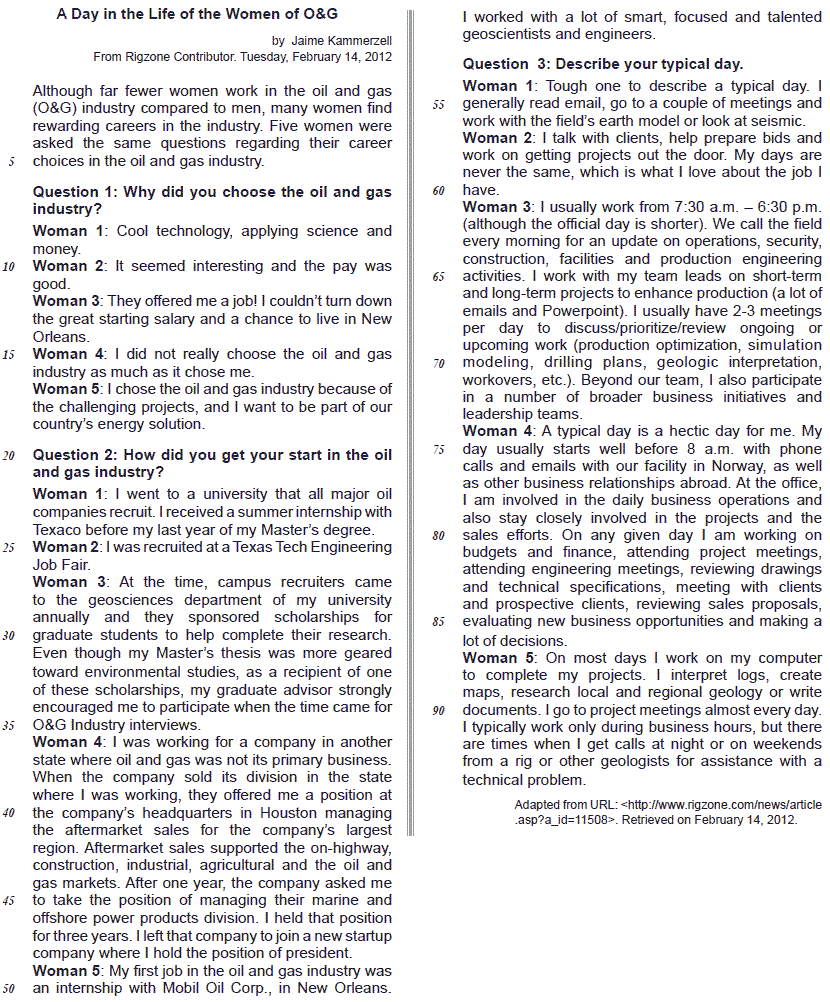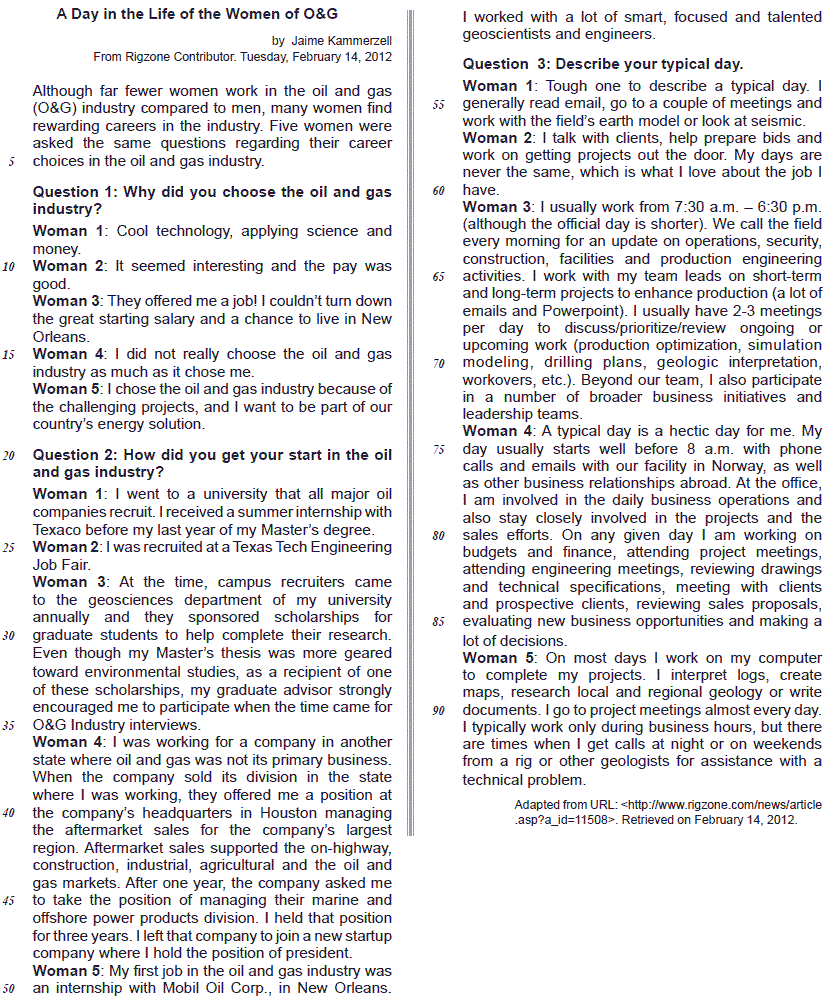Questões de Língua Inglesa da Fundação CESGRANRIO (CESGRANRIO)
Lista completa de Questões de Língua Inglesa da Fundação CESGRANRIO (CESGRANRIO) para resolução totalmente grátis. Selecione os assuntos no filtro de questões e comece a resolver exercícios.
 The sentence, in Text I, in which the boldfaced expression introduces an idea of addition is
The sentence, in Text I, in which the boldfaced expression introduces an idea of addition is
- A. Although far fewer women work in the oil and gas (O&G) industry compared to men, many women find rewarding careers in the industry. (lines 1-3)
- B. I chose the oil and gas industry because of the challenging projects, (lines 17-18)
- C. Even though my Masters thesis was more geared toward environmental studies, (lines 31-32)
- D. as well as other business relationships abroad. (lines 76-77)
- E. but there are times when I get calls at night or on weekends from a rig or other geologists for assistance with a technical problem. (lines 91-94)
 In Text I, the expression turn down in I couldnt turn down the great starting salary and a chance to live in New Orleans (lines 12-14) could be replaced, without change in meaning, by
In Text I, the expression turn down in I couldnt turn down the great starting salary and a chance to live in New Orleans (lines 12-14) could be replaced, without change in meaning, by
- A. refuse
- B. take
- C. accept
- D. request
- E. understand

According to the text, all the examples below are illnesses directly associated with the recent oil spill in the Gulf of Mexico, EXCEPT
- A.
heart stroke.
- B.
food poisoning.
- C.
vertiginous sensations.
- D.
lung diseases.
- E.
skin and eye irritation.

According to Dr. Paul Lioy in paragraphs 5 and 6, volunteers
- A.
have been recruited to replace the National Guard members.
- B.
are subject to several risks in trying to aid in the recovery of the areas affected.
- C.
could not be affected by chemical poisoning since this is a risk that only strikes oil workers.
- D.
can cooperate in cleaning the area only after they undergo extensive professional training.
- E.
should not be part of the rescue force because they can be better employed as lawyers or accountants.

The word may in They may be lawyers, accountants, your next-door neighbor, (lines 40-41) expresses
- A.
ability.
- B.
advice.
- C.
certainty.
- D.
necessity.
- E.
possibility.

In terms of reference,
- A.
...them. (line 5) refers to ...advisors... (line 3).
- B.
which... (line 24) refers to discussions... (line 23).
- C.
Many... (line 35) refers to ...members... (line 33).
- D.
They... (line 40) refers to ...hazards (line 36).
- E.
...whom... (line 51) refers to ...ailments, (line 49).

In paragraph 9, Dr. Jeff Kalina affirms that Petroleum has inherent hazards... (line 53) because he feels that
- A.
it is neurologically harmful for the family of workers in oil rigs.
- B.
the health risks associated with oil prospection are completely unpredictable.
- C.
the damages it causes on the environment are intrinsic to the way oil is being explored.
- D.
direct exposure to the chemicals it contains can cause different kinds of health disorders.
- E.
all of the risks associated with the oil production are known but are not made public.

In replacing the word if in the sentence If petroleum gets into the lungs, it can cause quite a bit of damage to the lungs [including] pneumonitis, or inflammation of the lungs. (lines 57-60), the linking element that would significantly change the meaning expressed in the original is
- A.
in case.
- B.
assuming that.
- C.
supposing that.
- D.
in the event that.
- E.
despite the fact that.

In the fragments to look at what we know and what are the gaps in science, (lines 20-21) and They may be lawyers, accountants, your next-door neighbor, he pointed out. (lines 40-41), the expressions look at and pointed out mean, respectively,
- A.
face revealed.
- B.
seek deduced.
- C.
examine adverted.
- D.
investigate estimated.
- E.
glance at mentioned.

Based on the information in the text, it is INCORRECT to say that
- A.
Dr. Maureen Litchveld feels that it is important to learn more about the immediate and future effects of oil extraction on the workers and surrounding population.
- B.
Dr. Nalini Sathiakumar considers that the civilians in the neighboring cities do not need to worry about seafood being contaminated.
- C.
Dr. Jeff Kalina believes that production workers involved in the field where the oil spill occurred run the risk of suffering from respiratory problems.
- D.
Dr. Robert Emery speculates whether the workers in the field of the disaster might need other devices to prevent further health problems.
- E.
Dr. Paul Lioy remarks that not all volunteers cleaning up the damage to the environment have received proper training on how to deal with such situations.


